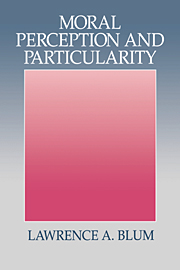2 - Iris Murdoch and the domain of the moral
Published online by Cambridge University Press: 12 January 2010
Summary
In The Sovereignty of Good Iris Murdoch suggests that the central task of the moral agent involves a true and loving perception of another individual, who is seen as a particular reality external to the agent. Writing in the 1960s she claimed that this dimension of morality had been “theorized away” in contemporary ethics. I will argue today that twenty years later, this charge still holds true of much contemporary ethical theory.
Murdoch's view is that morality has everything to do with our concerned responsiveness – what she also calls “loving attention” – to other particular individuals, where this responsiveness involves an element of particularity not reducible to any form of complex universality. In Murdoch's writing personal relationships are the principal setting in which this moral endeavor takes place. Thus loving attention to a friend or to one's child involves understanding his or her needs and caring that they are met. The moral task is not a matter of finding universalizable reasons or principles of action, but of getting oneself to attend to the reality of individual other persons. Such attention requires not allowing one's own needs, biases, fantasies (conscious and unconscious), and desires regarding the other person to get in the way of appreciating his or her own particular needs and situation.
Because one's love for the other person is inextricably bound up with the importance of that person to one's own life, seeing the other in herself – distinct and separate from oneself–is, Murdoch emphasizes, a difficult task.
- Type
- Chapter
- Information
- Moral Perception and Particularity , pp. 12 - 29Publisher: Cambridge University PressPrint publication year: 1994



